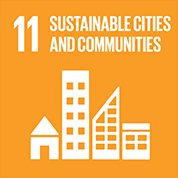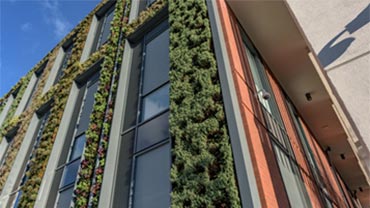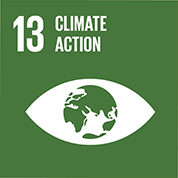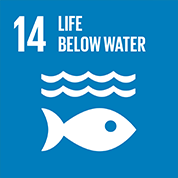Climate change
Adapt
While the majority of our focus needs to be on avoiding the worst effects of climate change, the impact of climate change is already with us. To date, the global average annual temperature has already increased by 1oC. This means that we must future proof our campus for future projections of an increase in temperature.
Smart cities and resource efficiency
 The eleventh Sustainable Development Goal involves reducing the adverse effects of natural disasters, by implementing policies for inclusion, resource efficiency and disaster risk reduction.
The eleventh Sustainable Development Goal involves reducing the adverse effects of natural disasters, by implementing policies for inclusion, resource efficiency and disaster risk reduction.
University operations
We are developing our campus in accordance with climate adaptation guidelines. This involves more outdoor shade, green walls and roofs, more resilient biodiversity and increased provision of drinking water.
Research
 The University’s Centre for Materials Research is collaborating with other UK universities and industrial partners on research into facilitating a circular economy in lithium ion batteries for electric cars. The interdisciplinary Anthropocene Research Group is researching global challenges and exploring complex ways in which socio-economic ecosystems impact the Earth System, including looking at a range of urban issues into their geological context.
The University’s Centre for Materials Research is collaborating with other UK universities and industrial partners on research into facilitating a circular economy in lithium ion batteries for electric cars. The interdisciplinary Anthropocene Research Group is researching global challenges and exploring complex ways in which socio-economic ecosystems impact the Earth System, including looking at a range of urban issues into their geological context.
Disaster, risk reduction and resilience
 The thirteenth Sustainable Development Goal aims to strengthen resilience and adaptive capacity to climate-related disasters in order to prepare for changes in climate.
The thirteenth Sustainable Development Goal aims to strengthen resilience and adaptive capacity to climate-related disasters in order to prepare for changes in climate.
University operations
Our approach to development must consider sustainable measures such as energy efficiency and minimising waste through construction and occupation. The University’s Sustainable Design and Planning Design Guide ensures that risks associated with climate change are considered in the design of buildings. This includes approaches, such as use of sustainable drainage systems (SuDS) and flood proofing measures, which create longer term resilience.
Research
Research groups across the University are exploring how we can develop resilience and adapt to climate-related disasters. As part of the affiliated Civil Safety and Security Unit, Dr Nibedita Ray-Bennett works on the sociology of disasters, early warning systems and systems thinking, human security and securitisation in disasters, and reproductive health in post-disaster settings. In the Public Communication cluster, researchers explore how media and communication addresses environmental issues, such as climate change, and how this can shape public and political agendas.
 In the College of Science and Engineering, academics are looking at how climate change is changing the world around us. Dr Jasdeep Singh Anand, of the Earth Observation Science Group, is researching the rate of carbon storage and crop yield loss in the past two decades due to an increase in tropospheric ozone (O3) that affects vegetation and subsequently affects agriculture and climate change by reducing crop yields and absorbing less CO2 from the atmosphere. Professor Jens Zinke is exploring how coral reefs are responding to increasing pressures from climate change and local human action.
In the College of Science and Engineering, academics are looking at how climate change is changing the world around us. Dr Jasdeep Singh Anand, of the Earth Observation Science Group, is researching the rate of carbon storage and crop yield loss in the past two decades due to an increase in tropospheric ozone (O3) that affects vegetation and subsequently affects agriculture and climate change by reducing crop yields and absorbing less CO2 from the atmosphere. Professor Jens Zinke is exploring how coral reefs are responding to increasing pressures from climate change and local human action.